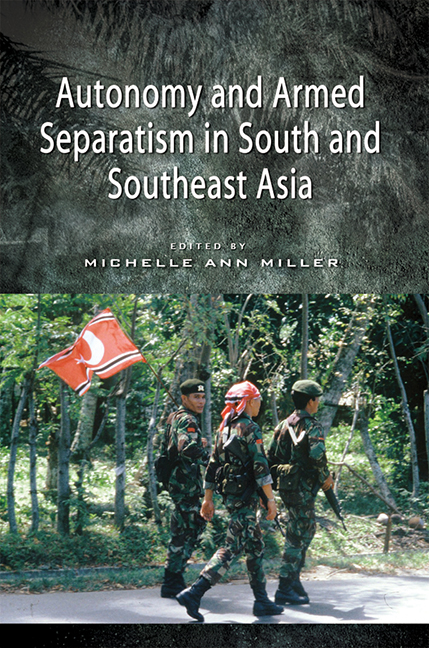Book contents
- Frontmatter
- Dedication
- Contents
- Acknowledgements
- About the Contributors
- 1 The Problem of Armed Separatism: Is Autonomy the Answer?
- 2 Mediated Constitutionality as a Solution to Separatism
- 3 Self-Governance as a Framework for Conflict Resolution in Aceh
- 4 Autonomy and Armed Separatism in Papua: Why the Cendrawasih Continues to Fear the Garuda
- 5 The Parallels and the Paradox of Timor-Leste and Western Sahara
- 6 Between Violence and Negotiation: Rethinking the Indonesian Occupation and the East Timorese Resistance
- 7 Struggle over Space in Myanmar: Expanding State Territoriality after the Kachin Ceasefire
- 8 Sri Lanka's Ethnic Conflict: The Autonomy-Separation Dialectic
- 9 Unitarianism, Separatism and Federalism: Competing Goals and Problems of Compromise in Sri Lanka
- 10 Autonomy and Armed Separatism in Jammu and Kashmir
- 11 Armed Conflicts and Movements for Autonomy in India's Northeast
- 12 Southern Thailand: The Trouble with Autonomy
- 13 The Last Holdout of an Integrated State: A Century of Resistance to State Penetration in Southern Thailand
- 14 Interlocking Autonomy: Manila and Muslim Mindanao
- 15 History, Demography and Factionalism: Obstacles to Conflict Resolution through Autonomy in the Southern Philippines
- 16 Conclusion
- Index
3 - Self-Governance as a Framework for Conflict Resolution in Aceh
Published online by Cambridge University Press: 21 October 2015
- Frontmatter
- Dedication
- Contents
- Acknowledgements
- About the Contributors
- 1 The Problem of Armed Separatism: Is Autonomy the Answer?
- 2 Mediated Constitutionality as a Solution to Separatism
- 3 Self-Governance as a Framework for Conflict Resolution in Aceh
- 4 Autonomy and Armed Separatism in Papua: Why the Cendrawasih Continues to Fear the Garuda
- 5 The Parallels and the Paradox of Timor-Leste and Western Sahara
- 6 Between Violence and Negotiation: Rethinking the Indonesian Occupation and the East Timorese Resistance
- 7 Struggle over Space in Myanmar: Expanding State Territoriality after the Kachin Ceasefire
- 8 Sri Lanka's Ethnic Conflict: The Autonomy-Separation Dialectic
- 9 Unitarianism, Separatism and Federalism: Competing Goals and Problems of Compromise in Sri Lanka
- 10 Autonomy and Armed Separatism in Jammu and Kashmir
- 11 Armed Conflicts and Movements for Autonomy in India's Northeast
- 12 Southern Thailand: The Trouble with Autonomy
- 13 The Last Holdout of an Integrated State: A Century of Resistance to State Penetration in Southern Thailand
- 14 Interlocking Autonomy: Manila and Muslim Mindanao
- 15 History, Demography and Factionalism: Obstacles to Conflict Resolution through Autonomy in the Southern Philippines
- 16 Conclusion
- Index
Summary
The signing of an historic peace agreement on 15 August 2005 in Helsinki by the Indonesian government and the armed separatist Free Aceh Movement (Gerakan Acheh Merdeka, GAM) brought an end to one of the most enduring armed separatist conflicts in Asia. This agreement was strengthened by the introduction in July 2006 of a Law on Governing Aceh (LoGA), which incorporated many of the core components of the Helsinki agreement and conferred quasi-federal powers of “self-government” to Aceh within the Indonesian unitary state. Though Jakarta had in the past offered different forms of “special autonomy” to Aceh in an effort to win its would-be nemesis back to the Indonesian nationalist cause, this was the first time GAM had been persuaded to transform their militant movement into a political organization that could constructively engage with Indonesia's process of political development.
This chapter will consider the nexus between Jakarta's different offers of autonomy to Aceh and the growth and reduction of Acehnese separatist activity. It will examine how and why Jakarta's decision to grant Aceh self-government buttressed the Helsinki peace process when previous special autonomy packages had failed to abate hostilities between the warring parties. Finally, the chapter will consider what makes Aceh's self-governing status unique and assess the province's prospects for sustainable peace under the new system.
The central conclusion of the analysis is that the most critical variable in the resolution of the almost three-decade-old Aceh conflict was political will, or agency. This political will was certainly reinforced, if not to a great extent, created by particular circumstances such as the December 2004 Indian Ocean tsunami and by the international pressure and assistance that followed the natural disaster. Yet natural disasters do not end human conflicts, and without political determination Jakarta and GAM would have been unable to broker a negotiated settlement and remain basically committed towards the long-term project of establishing the self-government of Aceh in Indonesia. Without political will, Jakarta would also have been unable to subordinate the Indonesian military (TNI)2 to civilian control at a time when its informal influence over central government decision-making was considerable, and when an unprecedented number of security forces personnel were engaged in counterinsurgency operations in the province.
- Type
- Chapter
- Information
- Publisher: ISEAS–Yusof Ishak InstitutePrint publication year: 2012



